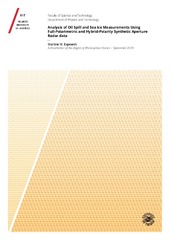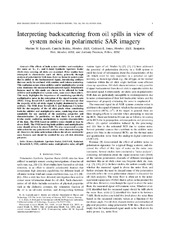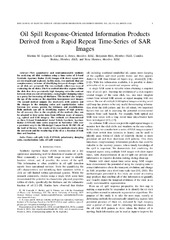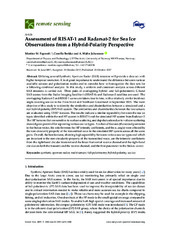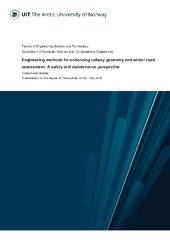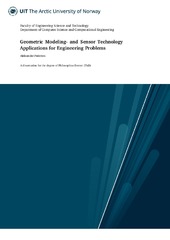| dc.contributor.advisor | Brekke, Camilla | |
| dc.contributor.author | Espeseth, Martine | |
| dc.date.accessioned | 2019-12-20T13:54:58Z | |
| dc.date.available | 2019-12-20T13:54:58Z | |
| dc.date.issued | 2019-12-05 | |
| dc.description.abstract | Synthetic Aperture Radar (SAR) data has been used for decades to detect oil slicks and monitoring sea ice. With increased oil and gas exploration in the Arctic follows higher risk for oil spills. Knowledge of the sea ice and oil spills is important for making clever and efficient decisions in a hectic and non-hectic operational situation. The potential and limitations of the hybrid-polarity (HP) SAR mode for oil spill and sea ice applications are evaluated in this thesis, and results show that the HP mode is almost as good as the full-polarimetric (FP) SAR mode. This thesis also recommends FP and HP features suitable for oil slick detection. These are identified to have a strong connection to oil damping of the small-scale ocean surface roughness in two-scale Bragg models. Separability of various Arctic sea ice is evaluated, and the results indicate a similar separability performance using real- and simulated HP data. The backscattered signal from oil slicks might be contaminated by various system noise sources, especially for spaceborne instruments. This will limit the ability to use the data for any scattering analysis or information extraction of physical oil properties. A set of well known polarimetric features are shown to be highly influenced by system noise, both additive and multiplicative. The reasons for what has often been assumed a different scattering mechanism within oil slicks, frequently termed non-Bragg in the literature, is concluded to mainly be a result of system noise. This thesis also explores methods that provide complementary information products that could be valuable in the oil spill recovery process. The methodologies are aimed at creating maps that combine several SAR images to make products that quantify and visually depict the temporal evolution of the slick in an easily understandable representation. | en_US |
| dc.description.doctoraltype | ph.d. | en_US |
| dc.description.popularabstract | Radar satellites have long been used to detect oil slicks and monitor sea ice. With increased oil and gas exploration in the Arctic follows growing risks for oil spills. Increased numbers of satellites and different imaging techniques means understanding their performance is important to fully take advantage of them. This thesis investigates the potential and limitations of different radar instruments for monitoring oil spills and sea ice. Many parameters can be extracted from polarimetric radar data. This thesis compares and identifies the parameters’ ability to detect various types of oil. A new type of radar imaging mode has been launched over the past years. We try to understand how this new imaging mode works for sea ice and oil slicks, and promising results are reported. Identifying actionable thick oil is important during a recovery process, and the use of radar data for making maps of relative oil thicknesses is investigated. | en_US |
| dc.identifier.isbn | 978-82-8236-374-7 (trykt) 978-82-8236-375-4 (pdf) | |
| dc.identifier.uri | https://hdl.handle.net/10037/16973 | |
| dc.language.iso | eng | en_US |
| dc.publisher | UiT Norges arktiske universitet | en_US |
| dc.publisher | UiT The Arctic University of Norway | en_US |
| dc.relation.haspart | <p>Paper I: Espeseth, M.M., Skrunes, S., Jones, C.E., Brekke, C., Holt, B. & Doulgeris, A.P. (2017). Analysis of Evolving Oil Spills in Full-Polarimetric and Hybrid-Polarity SAR. <i>IEEE Transactions on Geoscience and Remote Sensing, 55</i>(7), 4190-4210. Published version not available in Munin due to publisher’s restrictions. Published version available at <a href=https://doi.org/10.1109/TGRS.2017.2690001>https://doi.org/10.1109/TGRS.2017.2690001</a>. Accepted manuscript version available in Munin at <a href=https://hdl.handle.net/10037/13571>https://hdl.handle.net/10037/13571</a>.
<p>Paper II: Espeseth, M.M., Brekke, C., Jones, C.E., Holt, B. & Freeman, A. Interpreting backscattering from oil spills in view of system noise in polarimetric SAR imagery. (Submitted manuscript).
<p>Paper III: Espeseth, M.M., Jones, C.E., Holt, B., Brekke, C. & Skrunes, S. Oil Spill Response-Oriented Information Products Derived from a Rapid Repeat Time-Series of SAR Images. (Submitted manuscript).
<p>Paper IV: Espeseth, M.M., Brekke, C. & Johansson, M. (2017). Assessment of RISAT-1 and Radarsat-2 for Sea Ice Observations from a Hybrid-Polarity Perspective. <i>Remote Sensing, 9</i>(11), 1088. Also available in Munin at <a href=https://hdl.handle.net/10037/11692>https://hdl.handle.net/10037/11692</a>. | en_US |
| dc.relation.projectID | info:eu-repo/grantAgreement/RCN/SFI/237906/Norway/Centre for Integrated Remote Sensing and Forecasting for Arctic Operations/CIRFA/ | en_US |
| dc.rights.accessRights | openAccess | en_US |
| dc.rights.holder | Copyright 2019 The Author(s) | |
| dc.rights.uri | https://creativecommons.org/licenses/by-nc-sa/4.0 | en_US |
| dc.rights | Attribution-NonCommercial-ShareAlike 4.0 International (CC BY-NC-SA 4.0) | en_US |
| dc.subject | VDP::Mathematics and natural science: 400::Mathematics: 410::Analysis: 411 | en_US |
| dc.subject | VDP::Matematikk og Naturvitenskap: 400::Matematikk: 410::Analyse: 411 | en_US |
| dc.subject | VDP::Mathematics and natural science: 400::Mathematics: 410::Statistics: 412 | en_US |
| dc.subject | VDP::Matematikk og Naturvitenskap: 400::Matematikk: 410::Statistikk: 412 | en_US |
| dc.subject | VDP::Mathematics and natural science: 400::Physics: 430::Electromagnetism, acoustics, optics: 434 | en_US |
| dc.subject | VDP::Matematikk og Naturvitenskap: 400::Fysikk: 430::Elektromagnetisme, akustikk, optikk: 434 | en_US |
| dc.subject | VDP::Technology: 500::Environmental engineering: 610 | en_US |
| dc.subject | VDP::Teknologi: 500::Miljøteknologi: 610 | en_US |
| dc.title | Analysis of Oil Spill and Sea Ice Measurements Using Full-Polarimetric and Hybrid-Polarity Synthetic Aperture Radar data | en_US |
| dc.type | Doctoral thesis | en_US |
| dc.type | Doktorgradsavhandling | en_US |


 English
English norsk
norsk